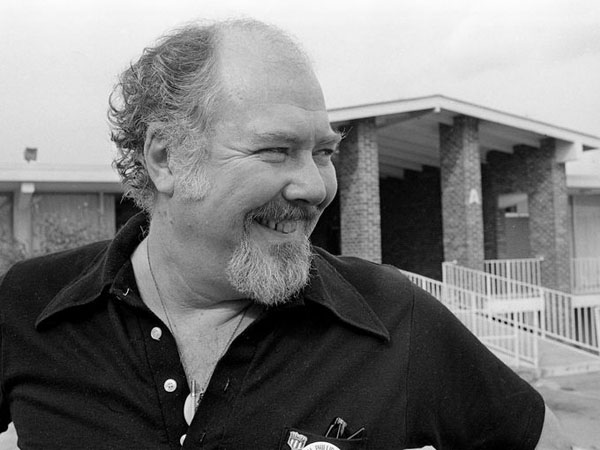When Criterion released Robert Altman’s Nashville (1975) on DVD and Blu-ray in December 2013, I posted a roundup of reviews and interviews, and one of the highlights remains Noel Murray‘s piece for the Dissolve. “Whether it’s meant to capture Nashville or not,” he wrote, after acknowledging “the whole local kerfuffle” the film had kicked up, “Nashville does take place in the city where I grew up, and enough of that city’s genuine character comes through that even at 16, I recognized the movie as being true—or at least true enough. And with each passing year, I see more of my various Nashvilles in the film.”
Today marks the 40th anniversary of Nashville‘s premiere in New York and we return to the Dissolve (and, in a moment, to Noel Murray), where it’s the “Movie of the Week.” In a dialogue with Genevieve Koski, Keith Phipps notes that the film—”and after multiple viewings over several years, I still don’t understand how—never shortchanges any of its 24 central characters. Everyone from Haven [Hamilton (Henry Gibson)] to Jeff Goldblum’s silent Tricycle Man get their moments, and a sense of an inner life we never get to see. What does Linnea (Lily Tomlin) feel as she leaves Tom’s (Keith Carradine) room? I’ve seen this film I don’t know how many times and I still couldn’t tell you.”
“Nashville witnesses a sociocultural sea change in real time, capturing the moment when the disillusionment of a post-Vietnam, post-Watergate generation of young people collided with the aggressively rosy patriotism that the old guard had trotted out for America’s bicentennial,” writes Charles Bramesco, adding that “with assistance from music supervisor Richard Baskin, as well as an extremely capable cast of singers, Altman assembled a collection of songs that would reflect a national turning point.”
Back to that dialogue for a moment. Koski, “born almost a decade after Nashville came out,” asks Phipps how well it captures the period. Turns out, he’s “exactly the right age to feel a bit of a personal connection to all those shots of children in the audience. This, the film seems to be saying, is the crazy world these kids are going to grow up in. And then we did.”
As its bits and pieces accumulate, Nashville bustles like a Brueghel cityscape. The camera’s attention flits from one sector of the ensemble to another. Music-industry aristocrats like Haven and Connie congregate with their respective entourages at venues or at the Hamilton estate. Below them in the film’s hierarchy are hangers-on, journalists, and groupies, trying but failing to penetrate that elite circle. Some, like smug out-of-towner John Triplette (Michael Murphy), can roam where they like; he strikes bargain after bargain as he recruits talent for an upcoming political rally. Others, like the elderly Mr. Green (Keenan Wynn), get swept up with the rest of this mob only by proximity, since his wife is staying at the same hospital as ailing country superstar Barbara Jean (Ronee Blakley). As these characters navigate the shows and soirees that constitute a weekend in Nashville, their movements outline a teeming ecosystem of power and art.
To Nashville, the city, where Altman, a series of 19 features and three shorts, is running at the Belcourt through July 7.
Writing for the Scene, Noel Murray suggests that the “series is clunker-free, but does feature a handful of near-masterpieces that are sometimes overlooked in favor of the M*A*S*Hes and Nashvilles.” He writes up five: California Split (1974), “one of the sharpest movies ever made about the poisonous qualities of some male friendships”; Thieves Like Us (1974), “a lovely elegy for a vanished American past”; 3 Women (1977), the “one must-see in the Altman ‘dream-film’ subgenre”; Secret Honor (1984), “the rare Altman film that shows some sympathy for a man in power”; and The Company (2003), which “practically becomes a thesis statement for his entire career—the purest expression of what he found so fascinating about humanity and the act of creation.”
Back to Nashville, the city and the movie. Richard Douglas Lloyd wrote the cover story for last week’s Scene, noting that Nashville‘s Nashville “is a burgeoning metropolis with a touchy relationship to its roots; a population of insiders and outsiders in uneasy proximity; a looming shift from rural to suburban; and an emerging streak of what looks like red-state conservatism, in a swiftly changing South. In short, four decades after the movie’s release, it holds up. To be sure, it’s a time capsule that shows how much has changed—the airport’s bigger, the downtown’s brighter, the skyline’s higher. But if contemporary Nashville, now basking in ‘It City’ triumphalism, looks very different from Altman’s small town with big-time aspirations, it is also its heir.”
For news and tips throughout the day every day, follow @KeyframeDaily. Get Keyframe Daily in your inbox by signing in at fandor.com/daily.




